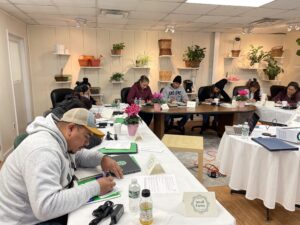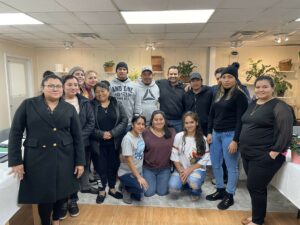Growing Latino Leadership in Suffolk County with Futuro en Ag
Something peculiar was happening at the Cornell Small Farms Program’s Futuro en Ag farm management skills course in Suffolk County in January. The flowers set out in the conference room stayed in pristine condition throughout the course – they didn’t show signs of stress even after several days. We finally discovered why.
By Mildred Alvarado, Nicole Waters, Tim W. Shenk
[Vea este artículo en Español]
Something peculiar was happening at the Cornell Small Farms Program’s Futuro en Ag farm management skills course in Suffolk County in January. The flowers set out in the conference room stayed in pristine condition throughout the course – they didn’t show signs of stress even after several days. We finally discovered why.
Quietly during breaks, participants in the course, who were team leaders at a local greenhouse, were tending these potted plants. One person deadheaded wilted flowers, another stuck a finger in the soil to check the moisture level. One would think they would take a break from this. After all, they grow flowers all day at the greenhouse. Yet this small detail gave us facilitators a glimpse of how diligent and passionate they are about their work.

Futuro en Ag students in Suffolk County deep in thought and hard at work, January 2023. Nicole Waters / Cornell Small Farms Program
Our role in Futuro Farm Management Skills Development courses is to make space for Spanish-first farm employees, team leaders and supervisors to develop management skills in the fast-paced, multicultural environments they work in. The Latino farmers and employees we work with are eager to learn tools to improve leadership, team-building and conflict resolution.
One manager wondered why the employees on his team didn’t open up to him easily with problems or concerns. Another participant responded with a Spanish idiom: En boca cerrada no entra mosca, which translates to “A fly doesn’t fly into a closed mouth.”
“Where I’m from, we’re taught not to say anything if we have an idea, or if we’re upset,” he explained. “When you open your mouth is when you draw attention to yourself and get in trouble.” Participants learned that they might be making incorrect assumptions or assessments about another person’s actions if they didn’t understand their cultural background.
In the Futuro en Ag project, we’re committed to supporting the leadership development of people in the ag industry who have been overlooked. For example, two greenhouse managers taking part in our course spoke up to say that this was the first managerial training they’d ever received in the United States. One had been working on Long Island for 26 years, the other for 41. Futuro en Ag fills that gap, bringing innovative training to a community with few opportunities for professional development.
The course in Suffolk County in January was attended by 24 farm leaders from 12 different countries, marking the project’s most diverse training to date. These team leaders went through an intensive professional development experience, tackling topics such as business and organizational communication, team building, conflict resolution and emotional intelligence in multicultural farm leadership. When asked about their motivation for attending, their response was clear. In addition to gaining technical skills, Latino farm managers are interested in opportunities to improve their management, communication and leadership skills.
The Futuro en Ag project seeks to provide these opportunities in collaboration with Latino farmers themselves. We listen and gather feedback from farmers across the state, and we partner with inclusive farming operations and service providers to ensure our curriculum meets the expressed needs of the Latino agricultural communities we serve.
Futuro en Ag: Growing produce, cultivating leaders
The 2023 Futuro en Ag Suffolk County cohort was a unique gathering of cultures, convening leaders from different parts of the world. We began the course by sharing our family histories, goals and hopes for the future. It became clear that we all represent the dreams of our parents and grandparents, no matter where we were born.
Participants shared characteristics of leaders who have changed their lives and inspired the development of their own agricultural careers. They valued friendly, relaxed and respectful managers who celebrate their achievements and share their challenges. They appreciated managers who trust them to make decisions, make them feel valued and model fair, inclusive leadership.
This exercise helped team leaders reflect on their own management style: How could they reflect those positive qualities with employees under their charge? They took that challenge seriously and by the end of the course were beginning to see themselves as part of the next generation of leaders in agriculture in New York State. Most aspire to own their own homes, farms and farm businesses, and they are among those who will provide food, jobs, community stability and stewardship of natural resources and regional economies.
Latino leaders face many of the same challenges as anyone trying to make a living in agriculture. In addition, they have to navigate the added difficulties of language and cultural barriers. Based on this experience, Futuro students have made the following recommendations for more effective farm leadership:
- Define roles and goals based on the values and skills of the team, as well as the business.
- Develop innovative and inclusive organizational structures that are both representative and functional
- Trust and delegate key functions to key employees
- Show explicit appreciation for the work of diverse communities
- Communicate in a way that is easily understood and have patience to repeat instruction and training as often as necessary to empower new leaders.
For better or worse, conflicts are part of our lives. Through our work with multicultural ag operations, we have found conflicts to center on interpersonal and leadership conflicts, yet given the demographic makeup of the current agricultural industry of NYS, a lack of cultural understanding and low communication skill sets cannot be overlooked. Effective communication, cultural understanding, establishing common goals, and providing adequate training opportunities for all employee levels are additional recommendations provided by Futuro students to decrease workplace conflict and build strong multicultural leadership within the business. Latino farm leaders should have access to educational opportunities beyond technical skills, to include all aspects of farm business management. It is essential for employees to feel appreciated and to understand the relevance of their work to the farm business.
Providing a Future, not just a Moment
The Futuro en Ag project will continue serving the Latino agricultural community of Long Island through our fruitful partnership with Cornell Cooperative Extension of Suffolk County. Executive Director Vanessa Lockel and Ag Program Leader Nora Catlin hosted us last summer, introducing us to local farmers and service providers. This led to the January course and Futuro’s representation at the Suffolk County Ag Forum.

Graduates of the Futuro en Ag Farm Management Skills Course, Suffolk County, January 2023. Nicole Waters / Cornell Small Farms Program
“Futuro en Ag, and the Cornell Small Farms Program as a whole, presents a great opportunity for Long Islanders of all descents to not only learn how our food systems actually work, but also to explore a future career in the agricultural industry,” said Lockel. “CCE Suffolk is proud to partner and collaborate with this empowering project.”
Lockel stressed that a core mission of CCE Suffolk is to create a more inclusive Suffolk County, and to celebrate the county’s diversity. She noted that there are nearly 3 million Latinx residents on Long Island and shared a commitment to making sure the agency’s programming extends to this significant population.
Chances are, the hands that tended the flowers on your table, or expertly pruned the apple tree for your cider, or harvested the vegetables in your fridge, belong to a Latino. Latinos make up 70 percent of the agricultural labor force in New York, and our goal is to help Latino farmers create a future for themselves in this state.
For more information, visit the Cornell Small Farms Futuro en Ag page.
Spotlight on Mildred Alvarado and Nicole Waters, core of the Futuro en Ag team
Life has a funny way of bringing people together and uniting us around common goals and causes bigger than ourselves. While Mildred grew up on a small coffee farm in rural Honduras and Nicole was raised in rural New York, we have discovered that farmers throughout the Americas have much in common.
We watch our hard-working elders cultivate the Earth to bring food to our table and produce to local markets. We take pride in feeding our communities. We strive to ensure a better future for our children. Mildred often says about her parents, “they did not tell us how to live, they showed us how to live.”
Our shared passion is cultivating multicultural ag leaders. Nurturing the leadership of others has a lot in common with farming: plant the seeds of new growth in the right conditions and provide ample light, sustenance and room to flourish.

